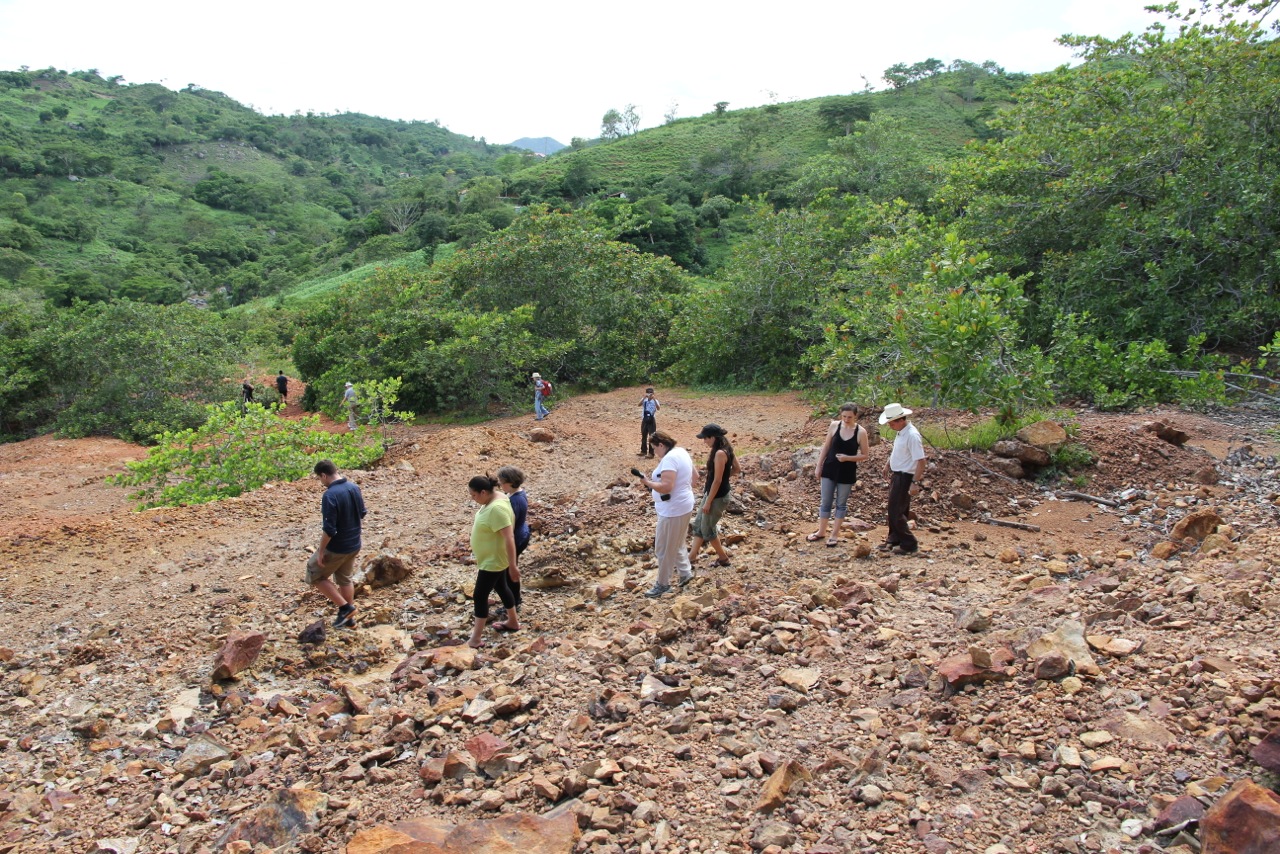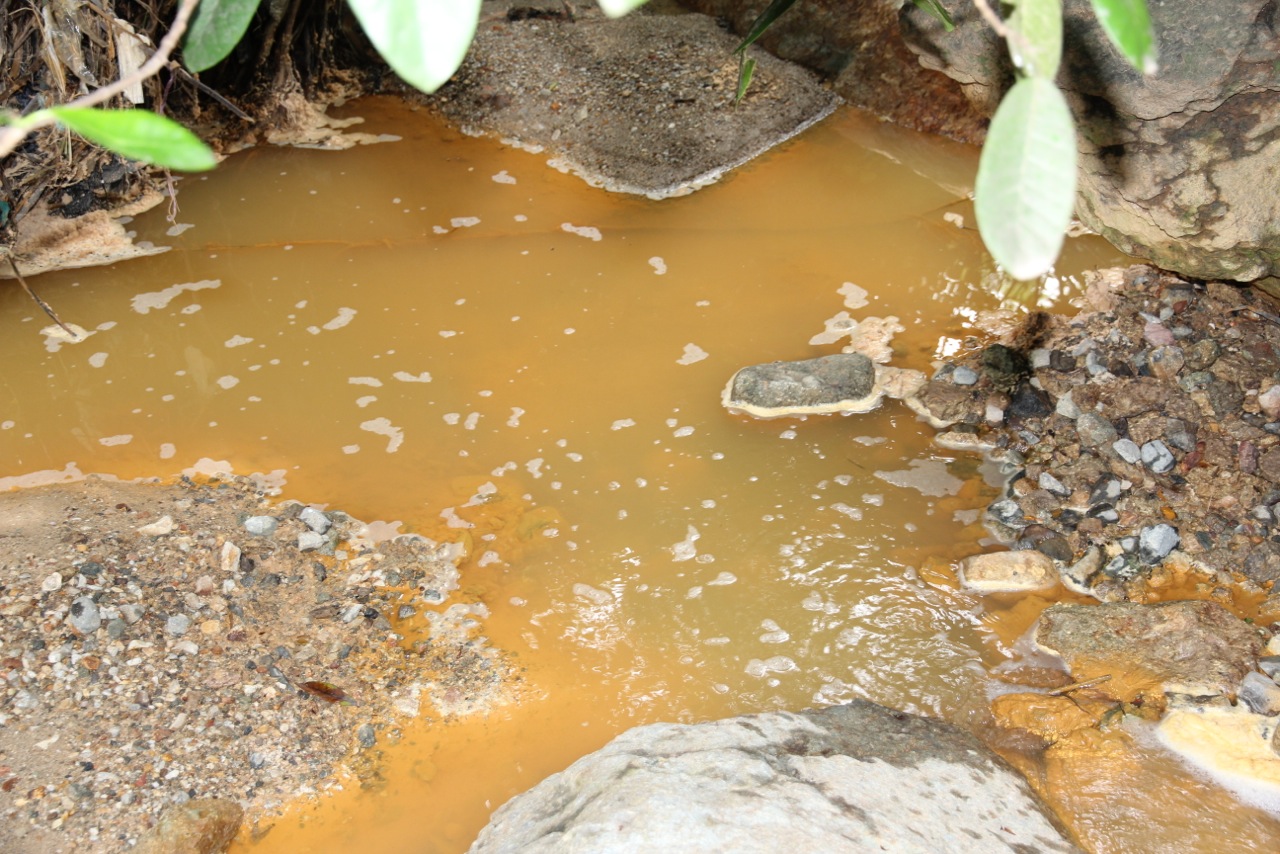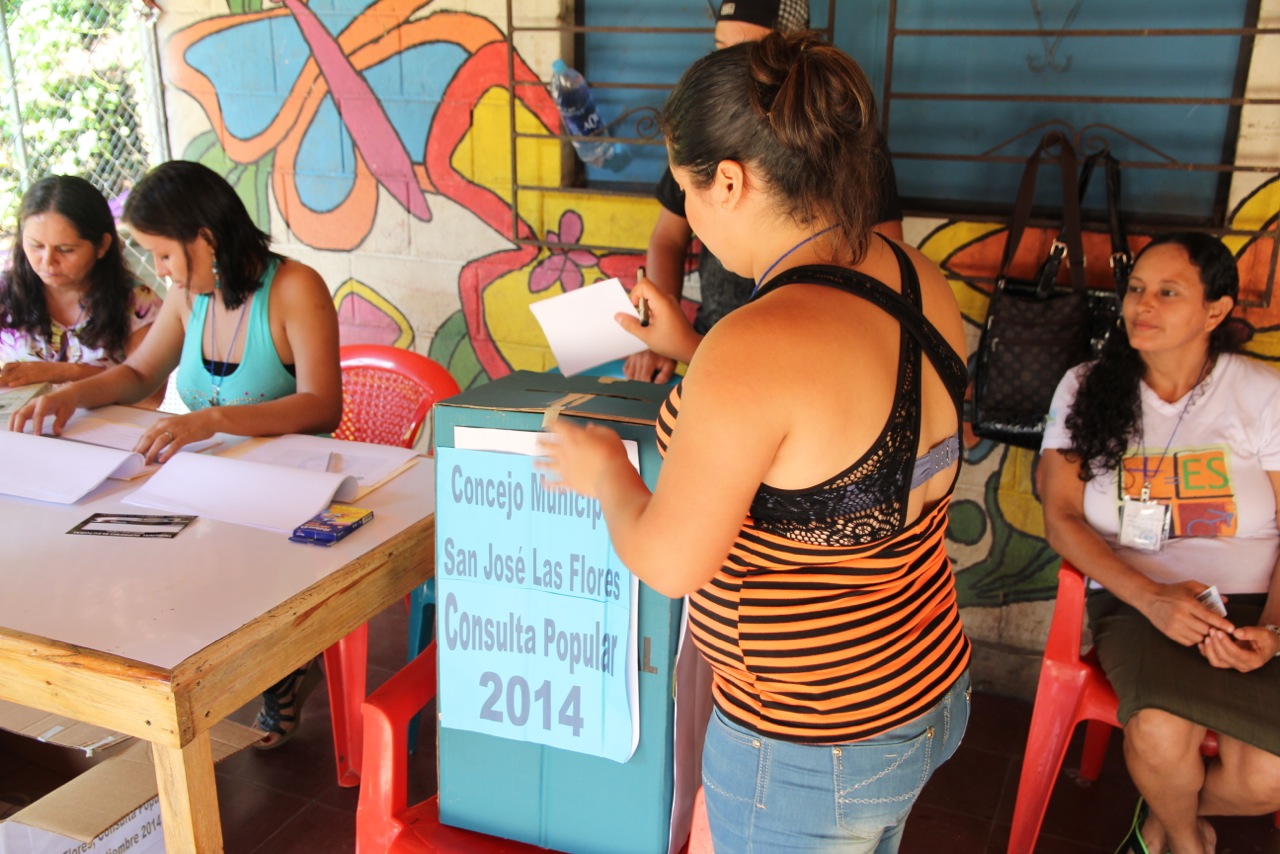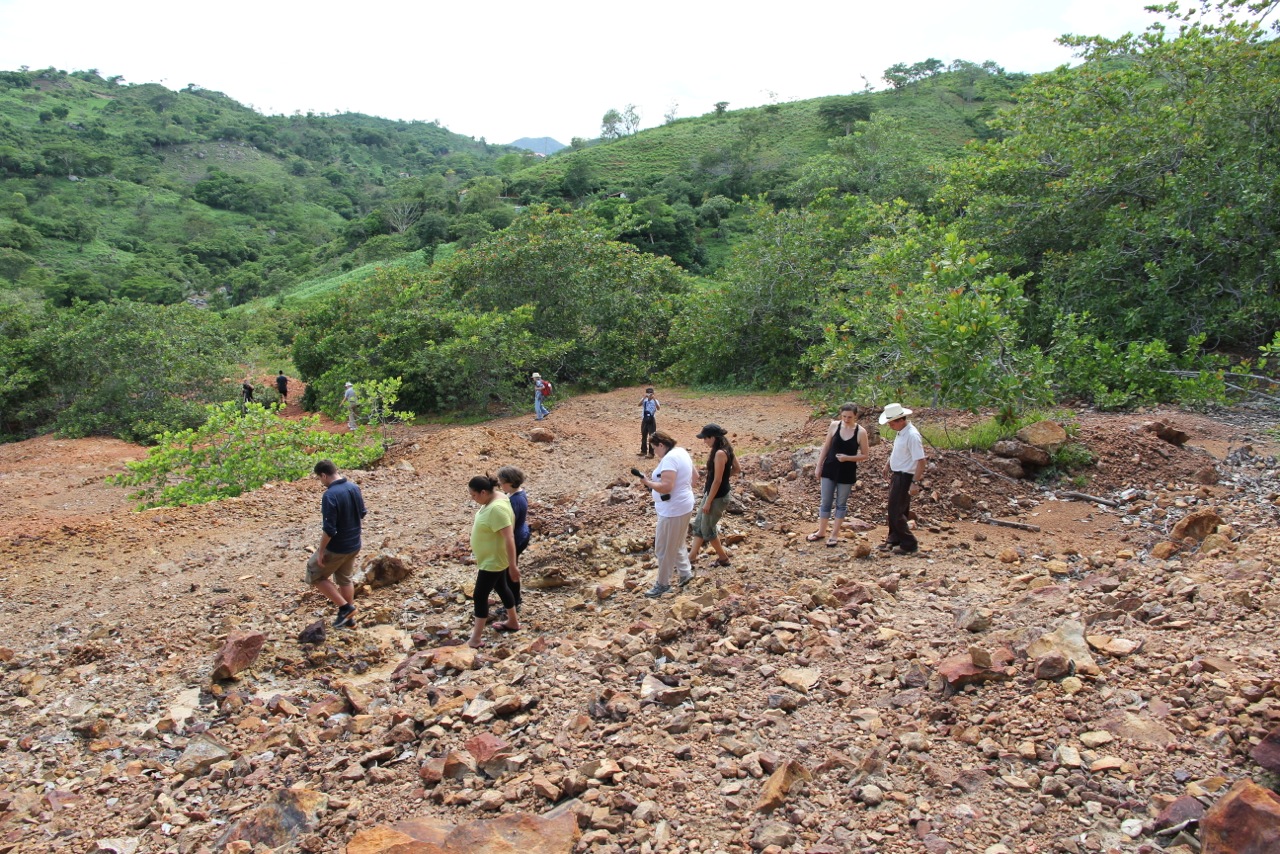I spent ten days in El Salvador this September representing the Council of Canadians on an international delegation examining metallic mining and how it affects communities. During the trip several events highlighted El Salvador’s struggle to remain a truly democratic and independent nation.
On September 15, which marked almost 200 years of independence for El Salvador, people were in the streets of cities and towns across the country to celebrate the occasion. September 15 was also the first day of the final hearings for the OceanaGold verses El Salvador investor state lawsuit at the International Center for the Settlements of Investor Disputes (ICSID) in Washington D.C., a suit that is a direct assault on the democratic independence of El Salvador.
On September 17 people took to the streets in front of the headquarters of the World Bank in San Salvador to protest against the suit.

Protest at World Bank headquarters in San Salvador, Photo credit Omar Navarro
The ICSID is a secretive tribunal housed at the headquarters of the World Bank in Washington D.C. The ICSID arbitrates these investor state disputes based on rules embedded in trade agreements and does not consider the environmental or social reasons for the disputes or their ramifications.
OceanaGold, a Canadian-Australian mining company, is suing El Salvador for $301 million for not issuing a mining license for a project called El Dorado. The project has the potential to contaminate the Lempa River, which provides water for two thirds of the population of El Salvador.
Another Canadian company, Pacific Rim, launched the original investor state lawsuit for $77 million over the El Dorado mine in 2009 after the company failed to meet the environmental requirements of the El Salvador government and the mining permit was not granted.
OceanaGold purchased Pacific Rim for $10.2 million in 2013 and has continued the investor state lawsuit, increasing it to $301 million.
People in El Salvador are understandably angry and want the suit dismissed. They question how OceanaGold could continue suing for $301 million when Pacific Rim, in reality, was worth only $10.2 million.
If El Salvador loses the case the World Bank can enforce the payment of the settlement by seizing the country’s assets, including aid, development or disaster relief funds destined for the country and use those funds to pay OceanaGold.

Part of the mine tailings dump in San Sebastian, La Union, Photo credit Pedro Cabezas
The international delegation toured several different regions of the country where mining has taken a toll environmentally and socially.
In San Sebastian, La Union we witnessed the environmental degradation and contamination from an open pit mine owned by Commerce Group of the U.S. Because the gold is found in small particles in volcanic rock, the rock needs to be crushed and soaked with chemicals including cyanide to extract it.

Water contaminated from acid drainage in San Sebastian, La Union, Photo credit Pedro Cabezas
The company had dumped the tailings from the mine on a hillside, leaving them exposed, creating acid drainage and the leaching of arsenic, cyanide, iron and other heavy metals into the river below. This has left a legacy of health and social problems for the communities downstream.
Gustavo Blanco, a local anti-mining activist, who gave us a tour of the contaminated site, told the delegation about the exceptionally high rates of death due to kidney failure in the communities.
Commerce Group had launched their own $100 million suit against El Salvador after the government revoked their operating license. That suit was based on the Central America Free Trade Agreement (CAFTA), which has a clause protecting investors from “indirect expropriation” and “discrimination” which can be interpreted to be any law, measure or policy that constrains a company and affects it’s potential profitability.
That case was dismissed on a technicality and has been closed after the company was unable to pay the fee needed for the appeal.
We also visited several communities in Cabañas, the region where the El Dorado mine was proposed; here we heard about the threats, intimidation and violence against out-spoken anti-mining activists.
In 2009 Marcelo Rivera, a well-known environmentalist and community organizer, was kidnapped, tortured and murdered and Dora Sorto, an eight month pregnant mother and anti-mining activist, was killed with a high power rifle while getting water from a community well. Her two-year-old son was injured in the attack.
In April 2013 the Court of Sensuntepeque determined that the deaths of five environmentalists could be attributed to the presence of Pacific Rim and the struggle against the El Dorado mine.
“El Salvador should be suing the mining companies for the problems they have created here,” explains Cristhain Alvarangu of the organization MUFRAS 32. “We invite the people who invest in these transnational companies to come here to where their money is being invested and live together and share the experiences with the families that are here… live the poverty, live the contamination, live the environmental destruction.”
On September 19, we attended a community forum where anti-mining activists from Canada, the U.S., Nicaragua, Honduras and Guatemala discussed struggles with mining companies in their respective communities.
In all of the situations they discussed, the national governments had sided with the corporations against the wishes of affected communities. In El Salvador the situation is different and the communities have convinced the national government to side with them against the mining companies — at least for now.

The vote in San Jose Las Flores, Photo credit Nestor Polanco
On September 20 the delegation attended a training session in election monitoring. The following day, September 21, the delegates volunteered as international observers of the consulta popular or popular consultation vote in the community of San Jose Las Flores.
The question on the ballot, “Do you support the establishment of metals mining, exploration and exploitation in San Jose Las Flores?” was decided with a resounding 99 per cent voting ‘No’. This historic vote utilized a provision in the El Salvador municipal code that allows municipalities to pass ordinances on issues of concern to the community.

Counting the ballots, photo credit Chris Hufstader/Oxfam America
How this vote and ordinance is treated and whether it is upheld and respected or challenged and ignored is of interest to communities struggling against mining companies around the world. Ultimately, the anti-mining organizations and activists in El Salvador want a permanent ban on metallic mining in the country.
El Salvador is small and densely populated; its main watershed, the Lempa River, is very susceptible to contamination, which would lead to a large exodus of environmental refugees. Mining for gold is simply not an acceptable option for the people of El Salvador.
Canadians should be paying close attention to the OceanaGold vs El Salvador case, not only because it’s a Canadian company bullying a developing country, but because Canada faces it’s own barrage of investor state lawsuits. There are currently $2.5 billion in suits against Canada under NAFTA and with the Harper Conservative government in a free trade agreement signing frenzy, Canadian taxpayers could soon be on the hook for billions in payouts unless we’re prepared to surrender our democratic authority to foreign corporations.
Paul Manly is a Nanaimo BC based filmmaker, activist and community organizer. He is the BC – Yukon region chapter representative on the national board of the Council of Canadians. His films include ‘You, Me and the SPP’ an expose on the Security and Prosperity Partnership between Canada, the United States and Mexico. He is currently developing a project that examines the impact of investor state dispute settlement mechanisms embedded in trade agreements.



